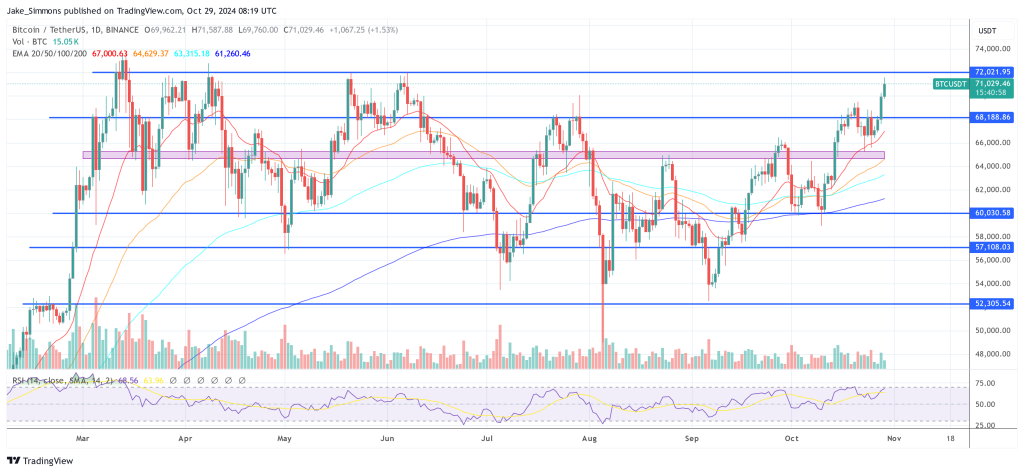Appearing on CNBC's “Squawk Box,” Matthew Siegel, head of digital asset research at investment firm VanEck, predicted that the potential adoption of Bitcoin by BRICS countries would lead to major changes in global trade dynamics. Mr. Siegel's insights come as concerns about fiscal policy grow in the United States and emerging economies step up efforts to circumvent traditional financial systems.
“Once the election results are confirmed, we believe Moody's will downgrade U.S. Treasuries, which could be a catalyst for Bitcoin,” Siegel said. He emphasized BTC's unique properties, saying, “Bitcoin is a chameleon.” It's hard to predict what that correlates with. There is a fixed amount of $21 million, so this is a non-US asset. ”
BRICS plans to adopt Bitcoin: VanEck
The BRICS bloc, which consists of Brazil, Russia, India, China, and South Africa, has recently expanded to include five new members: Egypt, Ethiopia, Iran, Saudi Arabia, and the United Arab Emirates (UAE). This expansion will increase the bloc's total GDP to exceed that of the G7 countries.
“BRICS met in Russia, and with six new members joining, their GDP is larger than the combined GDP of the G7,” Siegel said. “Three of the six new member countries – Argentina, UAE, and Ethiopia – are using government resources to mine Bitcoin. Outside the US, there is an urgent need to find a way around fiscal policy here in the US. ”
Russia is taking concrete steps to strengthen its BTC mining infrastructure. BitRiver, the country's largest data center operator, has partnered with the Russian Direct Investment Fund (RDIF) to build mining and artificial intelligence computing facilities across the BRICS countries. The partnership was announced at the BRICS Business Forum in Moscow on October 18, 2024.
BitRiver CEO Igor Runets said: “We will focus on building mining-based infrastructure. We will build data centers and connect them to the necessary power sources to enable the deployment and development of AI projects across the country. “I will.”
Siegel pointed to Russia's strategic move, saying, “Russia has announced that its wealth fund will invest in a regional fund to build Bitcoin mining across the BRICS, with the idea that global trade will be settled in Bitcoin. ” he said.
He suggested that future geopolitical changes could lead to wider acceptance of Bitcoin in international trade. “One day, I don’t know if it’s five years or 10 years from now, Putin will die. What are we doing?
RDIF CEO Kirill Dmitriev also echoed the idea of technological sovereignty, saying, “Developing computing capacity to implement artificial intelligence in various industries is a priority for Russia and its BRICS alliance partners. By collaborating, members can reduce costs, reduce dependence on foreign technology, and gain control over critical data.”
Notably, Siegel remains bullish on Bitcoin's future value. “Soon you'll be worth $100,000, $200,000. The smallest increase you've ever had was 2,000%. If you do half that, 1,000%, you'll be worth $180,000,” he predicted. did. He expects post-election US fiscal trends to be a key catalyst for Bitcoin's rise. “I think the post-election period will be an important trigger. You can see the front page of the Wall Street Journal talking about debt and deficit concerns. Moody's is telegraphing this.”
VanEck has developed a long-term model that predicts Bitcoin's dominance as a global reserve asset. “We have a model that assumes that by 2050, Bitcoin will be a reserve asset used in global trade, held in the world's central banks at just 2% interest, and that model assumes that by 2050 Bitcoin will be a reserve asset used in global trade, held at just 2% interest, ,” Siegel said. revealed.
At the time of writing, BTC was trading at $71,029.

Featured image created with DALL.E, chart on TradingView.com

